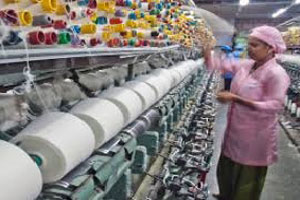
Bangladeshi yarn makers hit as Indian cotton traders halt shipment
YarnsandFibers News Bureau 2018-01-16 16:00:00 – DhakaBangladesh imports 46 percent of natural fibre from India spending about $3 billion a year for local consumption. With the sudden cancellation of shipment of 400,000 bales of cotton by Indian traders, after a rally in domestic prices and the rising rupee, the Bangladeshi yarn makers will be negatively affected which could deal a blow to apparel exports, said the industry insiders.
Abdul Hai Sarker, chairman of Purbani Group, said that their company imports 30,000 bales of cotton a year, 15 percent of which is from India.
India, the world's biggest producer of the fibre, after pest infestations squeezed supplies leading to price surge by more than 15 percent in the past six weeks.
The local spinners have already increased the prices of yarn after the latest move by the Indian traders, Mohammad Hatem, former vice-president of the Bangladesh Knitwear Manufacturers and Exporters Association said.
At present, the widely consumed 30-count yarn is selling at $3.30 a kilogram in the local market, up from $2.90 to $2.95 in the first week of the year, he said.
Hatem said that garment exporters had negotiated their work orders based on the previous rates of yarn, so the sudden spike in the rate will throw off their calculations and even their profit margins. Mehdi Ali, president of the Bangladesh Cotton Association, however, said the Indian cotton traders' about-turn is unlikely to cause much damage as the quantity of the cancelled shipment is too little.
There is nothing to be panicked about. They have lots of other sources of cotton, he said, citing the US, Australia, Brazil and some African countries as alternatives.
Cotton is an agricultural product, so it is vulnerable to the vagaries of nature like droughts and floods, pest attack and so on.
Ali added that they need to find a very strong alternative to India in order to ensure that their supply does not disrupt in case of any problem in a particular market.
After hurricanes raised doubts about the supplies from the US, a top exporter, late last year, Indian traders signed a flurry of contracts. Now, they are reneging on them.
Indian traders have so far shipped 1.5 million bales of the 2.5 million bales contracted since October 1, when the current year began, dealers said.
In fiscal 2016-17, Bangladesh imported 6.5 million bales of cotton, up from 5.5 million bales a year earlier. At the end of the current fiscal year,
Bangladesh likely to import 7.1 million bales of cotton.
According to the latest report of the United States Department of Agriculture, global cotton production is up nearly 7 percent to just over 120 million bales since May.
Market Intelligence
Ask for free sample Report

experience
Customer Base
dedicated team
Countries Served Worldwide









